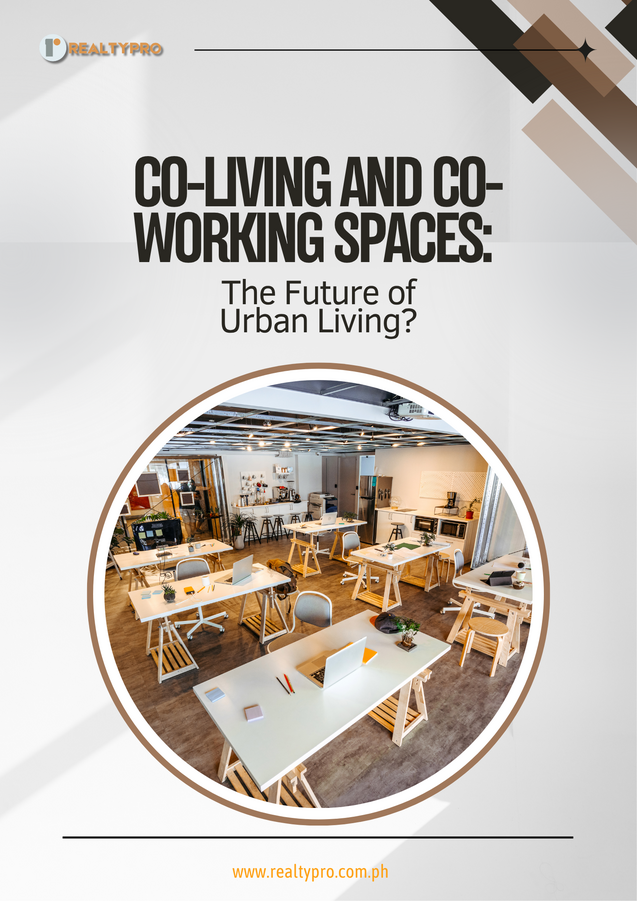Evolving Urban Lifestyles
In today’s fast-paced, ever-connected world, urban lifestyles are evolving. Traditional notions of living and working are being challenged, and a new trend is emerging: co-living and co-working spaces. This hybrid lifestyle model is gaining popularity not only in mega-cities like New York, Tokyo, and Berlin, but also here in Metro Manila and other key Philippine cities.
But what exactly are these spaces, and why are they seen as the future of urban living?
What is Co-Living?
Co-living is a modern form of communal living where individuals share a space—typically a house or condo—with other like-minded residents. Think of it as a long-term, adult version of a college dorm, but upgraded for working professionals. Each tenant usually has a private bedroom while sharing common areas such as kitchens, lounges, and sometimes even gyms and coworking hubs.
The idea behind co-living is not just about affordability—though lower costs do play a role. It’s about community, flexibility, and convenience. In fact, many co-living providers in the Philippines offer fully furnished units with inclusive utilities, Wi-Fi, weekly cleaning, and even social activities.
Perfect for millennials, digital nomads, freelancers, and even young professionals moving to a new city, co-living provides a sense of belonging while skipping the hassles of traditional renting.
And What About Co-Working?
Co-working, on the other hand, refers to shared workspaces where individuals or small teams work independently within a common office environment. These spaces are especially popular among remote workers, startups, and freelancers who don’t want to work in isolation or from cramped coffee shops.
In Metro Manila, cities like BGC, Makati, and Ortigas have seen a surge in co-working spaces from brands like WeWork, Common Ground, and local providers such as Acceler8 and KMC Solutions. These spaces offer not only desks and high-speed internet but also access to meeting rooms, printing facilities, coffee, and networking events.
The Perfect Match: Co-Living + Co-Working
Now here’s where it gets exciting: some real estate developers and lifestyle brands are combining both co-living and co-working in a single space. This combo offers a seamless lifestyle where residents can live, work, and socialize—all under one roof.
This integrated setup supports the rise of the gig economy and the increasing demand for work-life balance. Imagine waking up, grabbing your coffee, heading downstairs to a modern co-working area, then joining a community dinner at night—all without commuting or spending extra on overhead costs.
Plus, during the pandemic, many professionals realized that remote work is here to stay. As companies adopt hybrid models, co-living and co-working setups provide the flexibility and functionality that today’s workforce craves.
Why It’s Gaining Ground in the Philippines
Let’s face it: Metro Manila traffic is brutal. For young professionals, eliminating long commutes is a huge win. Co-living spaces in business districts provide easy access to offices, gyms, malls, and public transport. Combine that with the ability to work just a few steps away from your bedroom? That’s a game changer.
And for entrepreneurs or freelancers trying to grow a network, co-working hubs offer valuable exposure, collaboration, and opportunities. Many of these spaces even hold pitch nights, networking mixers, or skill-sharing events.
Conclusion: Is It the Future?
Co-living and co-working may not fully replace traditional homes and offices, but they’re definitely reshaping how we live and work in urban areas. With flexible terms, built-in communities, and multifunctional spaces, this trend is carving its place in modern Filipino life.
Kung ikaw ay isang young professional na gusto ng modern, flexible at hassle-free lifestyle—bakit hindi mo subukan ang co-living at co-working setup? Mas tipid, mas praktikal, at mas may sense of community pa!
Ito na kaya ang future ng urban living sa Pilipinas? Baka oo na nga. Kaya tara, explore na natin!
See our latest blog about From Contract to Sulk

